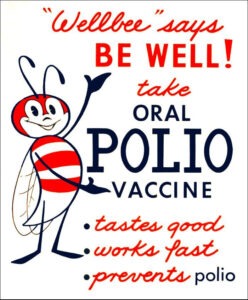 In 1952, polio spread throughout the United States crippling more than 58,000 people and killing more than 3,000 of those infected.
In 1952, polio spread throughout the United States crippling more than 58,000 people and killing more than 3,000 of those infected.
Then, Dr. Jonas Salk announced on CBS national radio that he had discovered the first successful vaccine for polio and the general public rejoiced.
Oh, the times they are a-changin’.
Today, while public health officials are concerned about a resurgence of the virus that causes measles, many scientists are troubled by the apathy and ignorance of parents when it comes to vaccines.
Neil Blackstone, a professor in the NIU Department of Biological Sciences whose field of interest is evolutionary biology, contracted measles as a child prior to the existence of the measles, mumps and rubella vaccine (MMR). He says it’s important to remember that the MMR and other vaccines are important elements to keeping people safe.
“We shouldn’t forget that science has changed our society,” Blackstone says. “When the polio vaccine was created, there were lines around corners. Everyone was anxious to vaccinate their children. Someday, we’ll look back at the outrage over this vaccine much like we do now with witchcraft.”
So why are parents leery of vaccines even though historically they have helped to drastically improve the quality of health care?
 The presence of celebrity input on the topic of vaccinations has helped perpetuate misinformation. With public figures such as Jenny McCarthy, Kristen Cavallari, Donald Trump and Rand Paul leading the MMR anti-vaxxer charge, it’s easy to understand why people are conflicted.
The presence of celebrity input on the topic of vaccinations has helped perpetuate misinformation. With public figures such as Jenny McCarthy, Kristen Cavallari, Donald Trump and Rand Paul leading the MMR anti-vaxxer charge, it’s easy to understand why people are conflicted.
Arlene Keddie, associate professor of epidemiology and program coordinator in NIU’s College of Health and Human Sciences, says the issue is twofold.
“Parents seem to be making decisions based on some form of media hype, coupled with the inability to critique scientific evidence,” Keddie says. “When they make decisions based on that, they’re not really protecting their children. At that point, it’s not just an individual matter; it’s a social issue.”
Blackstone, who echos that sentiment, says society is in a vacuum when it comes to vaccines.
“People have very little understanding of science in regard to the particulars,” Blackstone says. “Maybe part of the problem is that science has become science-by-press-conference – scientists are seeking celebrity status themselves. The less politics and celebrity play a role in public awareness, the better science will be as a result.”
The argument against vaccinating doesn’t hold water Keddie says.
 “Measles kills. If you look back historically, there were about 500 deaths per year in the U.S. before the vaccine existed,” Keddie says. “In addition to killing, measles can cause other complications like hearing loss. Autism is serious, but it doesn’t kill. There’s really no argument to be made because the vaccine doesn’t even cause autism.”
“Measles kills. If you look back historically, there were about 500 deaths per year in the U.S. before the vaccine existed,” Keddie says. “In addition to killing, measles can cause other complications like hearing loss. Autism is serious, but it doesn’t kill. There’s really no argument to be made because the vaccine doesn’t even cause autism.”
In 1998, British medical journal “The Lancet” published a study led by researcher and surgeon Andrew Wakefield cautioning that the MMR vaccine may lead autism and bowel disease.
However, “The Lancet” recanted the study in 2010, and 10 of the 13 original authors also renounced the published results. Later that same year, Wakefield was stripped of his license to practice medicine for reportedly embellishing the findings.
For Blackstone, the answer to treating diseases like measles comes down to pure, ethical science.
“The reason infectious disease is typically not a concern today is because of hard, solid scientific research. Those scientists who follow data, hypothesize and test, who are working out of the spotlight, who do all the hard work – that’s when progress will be made. Scientists like that are the ones who completely change society.”
Media contact: Andrew Hrubec – ahrubec@niu.edu
For more information about immunizations, contact NIU Health Services Preventive Medicine Clinic at (815) 753-9585.
NIU Immunization Requirements: http://www.niu.edu/healthservices/immunizations/index.shtml

